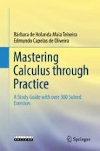- About MAA
- Membership
- MAA Publications
- Periodicals
- Blogs
- MAA Book Series
- MAA Press (an imprint of the AMS)
- MAA Notes
- MAA Reviews
- Mathematical Communication
- Information for Libraries
- Author Resources
- Advertise with MAA
- Meetings
- Competitions
- Programs
- Communities
- MAA Sections
- SIGMAA
- MAA Connect
- Students
- MAA Awards
- Awards Booklets
- Writing Awards
- Teaching Awards
- Service Awards
- Research Awards
- Lecture Awards
- Putnam Competition Individual and Team Winners
- D. E. Shaw Group AMC 8 Awards & Certificates
- Maryam Mirzakhani AMC 10 A Awards & Certificates
- Two Sigma AMC 10 B Awards & Certificates
- Jane Street AMC 12 A Awards & Certificates
- Akamai AMC 12 B Awards & Certificates
- High School Teachers
- News
You are here
Mastering Calculus through Practice

Publisher:
Springer
Publication Date:
2021
Number of Pages:
362
Format:
Hardcover
Price:
79.99
ISBN:
978-3-030-83339-8
Category:
Problem Book
[Reviewed by , on ]
John Ross
06/20/2022
In Mastering Calculus through Practice, Teixeira and Oliveira deliver over 300 exercises, complete with solutions, meant to supplement and enhance a student’s study of Calculus. The text offers very little in the way of fluff; in a direct manner, it jumps straight into problems of various levels of difficulty, organized by topic but not by difficulty. The 300+ exercises, and their solutions, make up the entirety of the text. The result is a text that could be useful for a dedicated self-studier of calculus, as well as a lecturer looking for inspiration when crafting problems and examples to use in class.
Chapters are organized around the fundamental topics found in a standard Calculus course; after an introductory chapter, the text has one chapter each on Functions, Limits, Derivatives, and Integrals. The text concludes with a recap chapter (offering new problems that span the previous topics). Most of the problems are typical of a Calculus 1 course, although it should be noted that a few problems span topics typically covered in Calculus 2. (For example, the Derivative chapter includes a problem on geometric series, and the chapter on Integrals includes a problem on improper integrals and another that introduces the concept of a solid of revolution.) Each chapter consists primarily of approximately 60 exercises (with the exception of the recap chapter, which is a bit shorter). Several of these exercises have complete (and detailed) solutions written out in the chapter, and all other exercises have less detailed (but no less complete) solutions included at the end of the text. I am admittedly unsure what criteria were used to determine which problems have their solutions in the main body of the text, and which were relegated to the back; however, every exercise has a solution somewhere in the text.
There is no denying that the problems in this text vary in difficulty and that this is done intentionally. The reasoning behind this is justified in the preface. The authors approached the writing of this book with the belief that students will learn the theory of calculus best by solving many problems with a variety of difficulties. Furthermore, the difficulty of the problems should be judged by the students themselves – there is no need to pre-grade the problems, starting with the simplest and moving towards the most difficult. When first looking at an exercise, the student “will have to decide if he/she needs to revise some concepts before solving it,” and this act of assessment is itself valuable. Furthermore, the authors argue, if a student is truly stuck, the full solutions are available to fall back on. Although I understand the author’s motivation here, I cannot help but feel that a first-semester college student might struggle to self-assess their knowledge while working through this text. This is especially true of the introductory chapter, which includes a variety of challenging exercises in logical reasoning, some basic set theory, inequalities, geometric formulas, trigonometry, and other algebraic manipulations – all good for a seasoned undergraduate mathematician looking to review, but perhaps intimidating for a first-semester calculus student who might fear they should have “mastered” all of this material previously.
In summary: Mastering Calculus through Practice offers a large number of challenging exercises, as well as complete solutions to these problems. I think the scattershot topics and levels of difficulty could make the text challenging to use for someone learning Calculus for the first time. However, for someone who has seen the material before and is looking to strengthen (or, indeed, master) the material, working through these problems could prove beneficial.
John Ross is an assistant professor of mathematics at Southwestern University.
See the publisher's website.
- Log in to post comments




